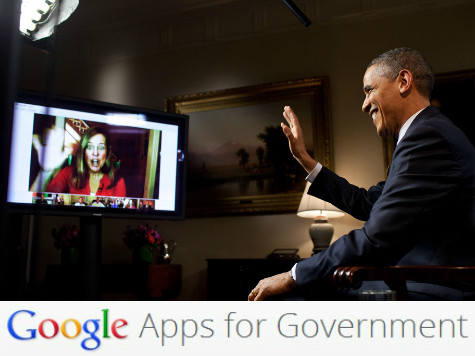On Thursday, Americans learned that since 2007 the National Security Agency (NSA) has operated a top-secret program called PRISM that vacuums up the actual contents–not just so-called metadata, as with the National Security Agency’s phone record collections–of emails, video and voice chat, photos, Skype calls, web chats, videos, file transfers, and social networking communications.
PRISM circumnavigates the need for court orders and allows the NSA to directly tap and mine data from America’s biggest technology companies like Google, Apple, Facebook, and others.
“They quite literally can watch your ideas form as you type,” one career intelligence officer told the Washington Post.
A senior Obama Administration official issued a statement stating that the “law does not allow the targeting of any U.S. citizen or of any person located within the United States.”
But as the Post notes, “NSA routinely collects a great deal of American content.” Such capturing of Americans’ content is “incidental,” claims the government. But the NSA’s laxity in determining whether a target is foreign or domestic is alarming. NSA agents merely enter a series of keywords and determine a 51% confidence in a target’s “foreignness” before moving forward.
PRISM began under President George W. Bush but according to the Post, under President Obama PRISM has enjoyed “exponential growth.” While top tech companies like Apple, Facebook, and Google deny any involvement or cooperation in PRISM, Obama’s closeness with Silicon Valley and the tech giants behind the rise of so-called Big Data are well established.
In 2009, Fortune Magazine featured a story titled “Obama and Google (A Love Story)” chronicling Obama’s relationship with his “corporate kindred spirit” beginning with a 2007 visit to Google headquarters.
“What we shared is a belief in changing the world from the bottom up, not from the top down,” Obama told Google employees.
Google employees have been among Obama’s top campaign contributors, donating $814,540 in 2008 and $801,770 for his reelection campaign.
In 2012, Google executive chairman Eric Schmidt recruited, coached, and strategized technology for the Obama campaign. Businessweek says Schmidt is now “investing millions to fund a consulting firm for businesses staffed by Obama’s former data analytics team.”
Indeed, this week the White House held another of its “We the Geeks” White House Google+ Hangouts series to “highlight the future of science, technology, and innovation here in the United States.”
As Fortune notes, “Neither Obama’s anticorporate leanings nor Google’s anti-‘politics as usual’ culture has stopped the two camps from collaborating closely.” Indeed, Obama appointed Schmidt to his Council of Science and Technology Advisers, and Google employees now work in the Obama White House.
What, then, explains Obama’s love for Silicon Valley and Big Data corporations?
Part of the answer is financial. Companies like Microsoft and Google bag millions selling their products and contracting their services to the government. Consider, for example, just one government agency like the Department of Interior. In May 2012, Google scored a $35 million contract for the agency’s “Google Apps for Government” program. In 2010, Microsoft was awarded a $59.3 million contract to run Interior’s email and collaboration systems.
Beyond contracts and campaign cash, Financial Times writer Edward Luce says one thing that unites Silicon Valley and Obama is a shared penchant for moral and intellectual posturing that places them on the side of the angels.
“One of the geekocracy’s main characteristics is a serene faith in its own good motives,” writes Luce. “It is hard to avoid the suspicion that Mr. Obama’s reputation for being a nerd shields him from tougher criticism. Call it geek exceptionalism.”
In reality, says Luce, Obama and Big Data have aligned to strike crony deals that grow government and profits.
“Self-interest, rather than virtue, guides the growing clout of these ‘Big Data’ companies in Washington. The same is often true of Mr. Obama.”
As any ardent student of capitalism knows, being “pro free-markets” is not the same thing as being “pro business.” Free markets thrive on real competition; some businesses embrace and support big government regulations or favoritism to kill of true competition. That is one reason the fusion of Big Data and Big Government portends alarming trends for those who care about free markets and free people.
Looking beyond the PRISM revelations, many of Washington’s current and future policy debates will involve Big Data’s desire to leverage its crony relationships with Obama, and Obama’s desire to expand the federal government’s power and reach.
One need look no further than Silicon Valley’s flexing of its well-funded muscles in the immigration debate to see how influential and powerful a player Big Data has become. And future debates, such as contracting with major medical technology companies for digitization of medical records as part of Obamacare or expansion of online education in schools and colleges, will show just how deeply the crony alliance between Obama and Big Data runs.
Now, even as the scandal surrounding the Internal Revenue Service’s (IRS) use of confidential information to politically target conservatives unfolds, the Obama Administration is telling Americans not to worry that the IRS will soon gain access to millions of Americans’ health insurance records as part of its role in implementing and policing 47 parts of Obamacare.
Whether Americans will stand athwart the fusion of Big Data and Big Government in the wake of the NSA PRISM revelations remains to be seen.
Regardless, the corrosive Big Data-Big Government cronyism that sacrifices individual liberties on the altar of Silicon Valley profits is likely to continue unabated.
After all, Obama was, in many ways, bought, paid for, and elected by Silicon Valley.

COMMENTS
Please let us know if you're having issues with commenting.